Alice Richard ‘The Lost Ones’ | Interview
I first met Alice Richard in the early summer of 2014 at a house party off of Mary Street. Alice, from the very first conversation, was different. Below is an interview with Alice on her live performance in N.C.A.D’s Final Year Exhibition.
In Ireland to attend N.C.A.D. for the completion of studies she began in her native France, Alice had found her way to this party through some mutual connection from back home. Learning that it was her very first night in Ireland, she told us quite simply somewhere on the makeshift dance-floor that ” Yes, I think I will live here.” Now, obviously this story – the foreign stranger at the party who decides this sesh gaff is literally her new home – is one that reveals both impulsivity and real personal necessity on Alice’s part. I don’t know if she really had any solid plans for how Ireland was going to work out if she hadn’t dropped sticks at the first distinctly Dublin techno and cans sesh she arrived at. I do know now though, that solid plans aren’t something Alice Richard takes too seriously. The artist – who has indeed lived in said house ever since and will continue to until June 20th, when she and her housemates are formally evicted by the bank that repossessed the property – is more interested in the unplanned. Richard’s contribution to the N.C.A.D. Final Year Exhibition is billed as a participative live performance, and even after having spoken in depth with the artist about her upcoming piece, it is impossible to really know what to expect. Of course, that’s the point. She cannot plan or predict what will happen but Richard – equipped with nothing more than the clothes on her back, a phone, charger and the 90 bottles of Kombucha she offers in return – is asking her audience to make something happen. More than asking, she is relying upon us all. Set to be a singularly unique attraction in this years exhibition, the performance entitled ‘The Lost Ones’ (a nod to an obscure and typically esoteric Samuel Beckett short wherein strange bodies search hopelessly for their ‘lost one’), began Friday, June 17.
I arranged an interview with Alice a week before it all kicked off. Greeting me warmly when she arrives (only a bit late) the 26-year- old asks me how she looks. I have to admit, her eyes do betray her current schedule. Pushing her dark red hair away from her face she tells me even when she’s sleeping, it isn’t rest. I’ve always known Alice to live and breathe her work. Pre-show, it seems, she sleeps it too.
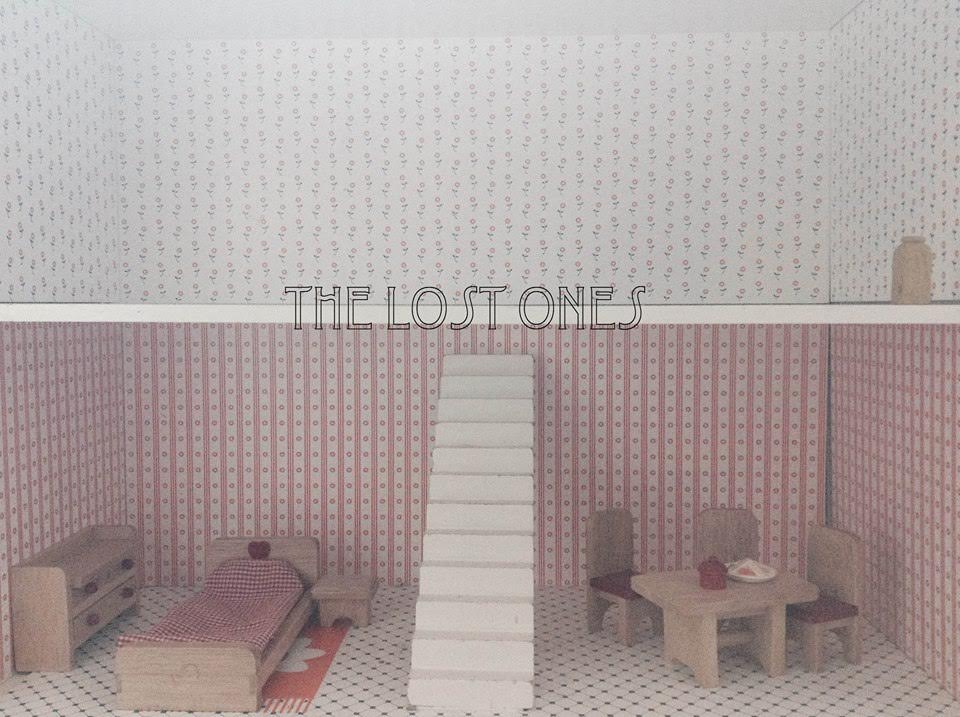
Can you give me a brief description of your project?
It’s from a writing by Samuel Beckett. I like the play between the fact Beckett was Irish living in France and I am French living in Ireland. The process of the project started a long time ago when I read the book, I was like ‘I really need to do a project about that’. To make it short, Beckett creates an environment where it’s really hard, impossible to live. The inhabitants of this environment, this cylinder in perpetual movement with changing temperature and light, are all actually in movement for one reason; they’re looking for something. But step by step, one after one, because it is so hard…they stop… When the last one stops looking, the book ends, and at the same time the cylinder shuts down. For me it is a beautiful metaphor about the inherent dependence between the ones looking and the existence of something. For me; of art, and of the world.
In your description of the event you talk about how you want people to participate; to give you ‘nourishment, nurture, a form of sustenance, provision of overnight accommodation, transport, direction, guidance’. So the nourishment theme comes from Samuel Beckett’s work because they stop nourishing?
For me, basically the Lost Ones is the name of my piece because it would be taking the book in reverse. So I am the first one looking – I am starting the search again and I am inviting people to join. By participating in my project they are participating in a change, so they are starting to look again, and because they look through this project they will look; maybe; hopefully; in their everyday life in small things or bigger things. That’s my hope.
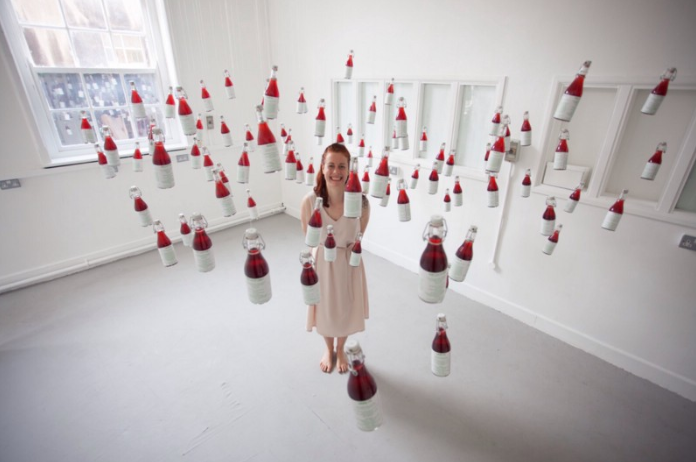
It’s going to be quite diffuse in what people bring to you in their participation. Something you mention in your description is 90 bottles of Kombucha, can you tell me about the significance of that?
It’s something that has value for me. It’s basically what I am giving in exchange for any participation. If I wasn’t giving value I couldn’t expect people to give me something they value. It is a double choice object cause you can drink it right away or you can choose to grow it as it is a culture. So there’s the choice to have the direct consumption of an object or to choose to keep it on. For me it would have been the same to offer a tomato; you can eat it right away and enjoy its benefits — same with the kombucha there are benefits, nutrients — or you can choose to keep the seeds and grow some in your garden… I want to question processed food, even cultures that use industrial aid. This kombucha is home brewed, I did it myself. This double choice is also poetically the position one can take relating to an art project. Is it something that changes them, their everyday life? Or will they forget as soon as they walk the door? I am embodying these questions in a bottle.
I’m aware of a previous project you did which involved homemade washing up liquid, so there’s perhaps a similarity there?
(She laughs) This is similar, yes, and it’s also similar to the project ‘5 Meals to Love’, or ‘Cinq Repas à T’aimes’, that I di d last year. The laundry detergent and the kombucha are similar for being homemade. In the project ‘Cinq Repas à T’aimes’ and this one, I see and use food as a material that allow you to both connect with others and with yourself … Basically, for me the kombucha is … by being homebrewed, and by being a drink you can share or reflect about, an invitation to connect us with nature and our nature in a way.
How has your college experience in N.C.A.D. shaped you as an artist?
N.C.A.D…. (she pauses, inhaling sharply.) I loved it a lot, because I got a lot of freedom. In France I was an art student, but in NCAD I was a young artist, that’s how I felt. I felt that my tutors really brought me to discover and define and shape my values but at no time told me what to do… It was more asking me questions, giving me influences but also and mostly trusting me, I think that’s actually what helped me the most… Especially my tutor who trusted in me all the time. By being trusted I went to the end of my potential… This year! I’m not saying, you know, it’s forever the end of my potential but I think I pushed a lot because I had someone telling me “Yes, do it.”
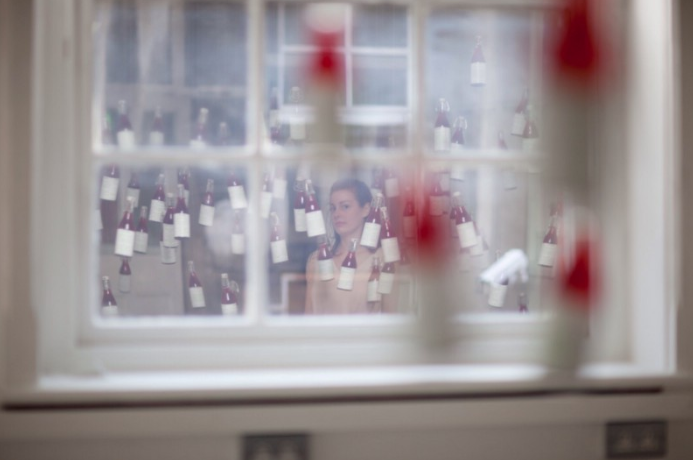
You had the chance to attend a workshop with the Irish artist Katherine Nolan, how was that?
That was too short. (She pauses). For me, performance is not possible in a one day workshop because you need to embody something and you need to… because you’re often working in groups, you need to… get to know each other and get to exist as a body, both yourself and the whole group and for me, one day is warming up.
What artists do you think are, or have been, influential to your work so far?
(Pause). Marina Abramovic. I hate saying that!
That was my next question! Because I’ve spoken to a couple of people about your work and your upcoming exhibition and that’s the name I’ve heard… Because she’s ‘the Grandmother of performance art’, she’s the one everyone knows… Does it annoy you to get that comparison, or do you find it somewhat flattering?
No, I understand why, because as I told you there’s a language of performance, so I understand what she’s doing and about her trainings, what she does, you know, people not eating, drinking only water, separating grains of rice, the white and the dark and stuff… This, my teacher in France, a performance artist, could have asked that. She didn’t because she wasn’t working the same way but it was the same kind of experiment and I think she was touched a lot by her. When I saw the movie ‘The Artist is Present;’ I felt deeply connected with her fight, because I think it is a fight… A commonality between the two, Abramovic and Nolan, is that they’re feminist artists.
Would you consider yourself to be a feminist artist?
Well… I am a feminist but I don’t know if I consider myself a feminist artist.
Do you think there’s an expectation – especially in Ireland at the moment – to be a feminist artist? Do you think there’s a pressure there?
I’m totally disconnected (she laughs). I have no idea because, for me, that’s why I’m telling you I’m not a feminist artist because that’s not what I defend, I defend humans. I admire feminists and I think I am one, but for the moment I am a feminist in my private life, I haven’t found a way to put that to the public because I don’t think I’;m defined enough, you know? I think for me, if I am talking about a subject I need to… not be an expert but not be a newbie, okay? So, what is foods connection with yourself, connection with nature, that has been a few projects and a few years that I am actually wondering. Feminist, always, since I was born, but I think my life is feminist, you know, but I have never been thinking about it, you know? Stopping and saying what it is… But I am touched and I react as a free woman, but am I fighting for other women? I don’t think so. Not yet.
You’re self-reflexive about that, which is something I think is important in feminism and in art. Coming towards your exhibition piece, do you think that’s something that will be read into it? Even in your future career?
Hopefully I will have a future career! (she laughs) Do I think I will be labelled as a feminist artist? I don’t think so, I hope: humanist, literally.
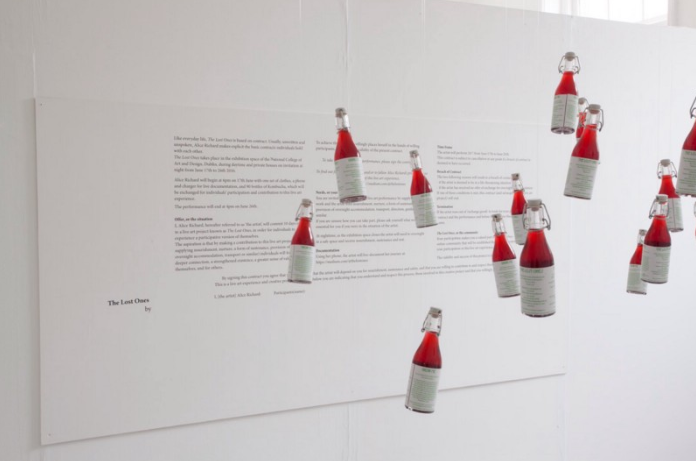
This year has two years graduating at once; what does that mean for you, for everyone you’re graduating with?
You mean because it's changed from 3 years to 4 years? For me, it doesn’t mean anything because when I applied for direct entry I didn’t know it was meant to be 4 years so I was actually kind of relieved when it was 3 years. Being in the media department, which is not really a studio based practice, I’m not really connected a lot with my classmates so I can’t say for sure what they’re feeling but I think the general feeling is that people feel that they are short in time. For me I’m actually happy because I have 3 years of drama, 2 years of dance…something like…one year collective dance and drama and one year of preparatory school to enter art school in France (she takes a breath) It’s really hard to enter art school in France. One year in Fine Art in France, two years in Ireland so that is already a lot of years! Now I’m finished all my studies, so it’s scary. Well! Finished! Who knows? But for now I feel I need to jump out of the nest, I’m so happy and scared at the same time.
Do you feel – especially as someone from an international background – that there’s an extra pressure for art graduates in Ireland, a lack of opportunities?
There’s a really big lack of opportunities. Internationally. As an artist I think you have to create your own opportunities. For the people I know, and it’s not only people in visual art, they all created their own opportunities, the ones who « succeeded ». I know also some who « failed », not really failed, but chose to go somewhere else. I had a bad winter actually, I was kind of depressed because of what I was doing; I was waiting to be « chosen ». I think, finally, you are not « chosen ».
That’s something that’s often talked about concerning final year exhibitions, especially NCAD, perhaps the most prestigious art college in Ireland, that it’s the big opportunity for potential collectors, potential curators –
– this, maybe for paint or print departments? Media work it’s actually like: you’re not gonna sell anything, plus we’re out of campus… This year because it’s such a big exhibition there are a lot of people out of campus, there are three places out of campus which might make it easier in a way. I feel especially for performance, and even in performance I’m kind of an outsider because I’m not into a binary relationship, but I am into being a catalyst, so it’s basically asking people to do my art. But it doesn’t mean I am not doing work before, you know? But it’s already hard for some people to consider performance as art… so you imagine like… Russian dolls, and you open and open and open them and I’m the little one and I don’t know where my place is… It’s hard for me to talk about all of NCAD or all students or even all media students, because media is really, really diverse.
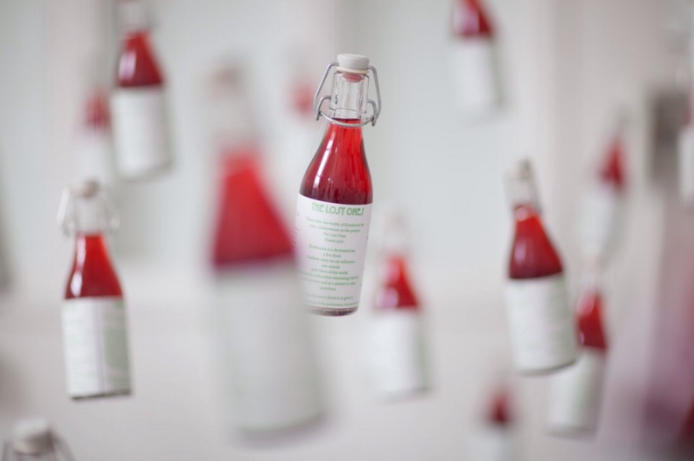
Part of your project will be live documentation; do you think that’s something you can’t escape from as a modern artist; social media and self-promotion?
The live documentation is not only about self-promotion, it is a way to guide people also, a way to create a movement… Actually I’m disturbed by your question a bit, and surprised, because I didn’t see it as self-promotion at all, even though I do think it’s interesting because people who are not physically in Ireland will be able to follow the performance. I’m gonna invite them to follow the performance, my friends and family, some artists in France. It is a tiny bit, now I realise… But actually, as a performer how do you show your work when it’s finished? And this is gonna be like my live documentation, it’s a blog, it will stay and this will be my documentation if I am talking to an artist or a curator or whatever saying “I did that”, how can I talk about it? What can I show?
What are your fears for the performance?
Yeah, my fears are big. (she laughs) First, before I talked to the assessment panel, they [my fears] were only about not lasting until the end, even though I will consider the piece itself to be a success even if I have to stop… Because that already means something. It actually means a lot if I have to stop because it means that nobody took upon themselves to make it continue. As an artist, as a live artist, there is life inside the fact that you didn’t take on me, to make movement, to make life keep on… for me, immobility is death so in a way I am giving you the opportunity to create life, to create and maintain life, as both my life and the life of the piece, the whole concept, saying that you can act upon everything that is around you… I forgot the question (laughs… loudly)
…Your fears?
(continues laughing, less loudly) Okay, yeah (becomes immediately serious). So, first I thought not going until the end would be my worst fear, then I got asked the question: “what if people are coming to abuse you?”because this can happen… This again, relates to Marina Abramovic.
Of course, Rhythm 0.
Rhythm 0! And also to Yoko Ono, uh, the cutting piece?.
Oh yeah, love that.
I feel close to these two works, but in a really different way. It’s that I am putting myself in the hands of the beholder but to push something else, to show something else, they were showing that if you’re giving humanity the power, they will hurt and I’m saying if you’re giving humanity the power they’ll make good. I think that now it’s a different time in society, I think now in society we’re so bad with ourselves, so sad, so lonely, so self… harming, you know? I think a work of art that is able to tell you you can experience a better version of yourself and feel good about it, then you actually feel valued, you know? I think that’s what I want to do so I didn’t want people to come to abuse and I am bit scared of it now cause I was blinding myself about it. Not by choice but because I was aiming a point that was so strong that I didn’t see the others on this side. So I’m afraid that I could be hurt even though I will go deep into it until I am endangered in any situation. I am giving myself, I’m trusting the one on the other side. For example my tutor told me “Ill give you my number, if something happens, you call me” This is participation to my work; someone saying “I won’t leave you in this situation alone.”
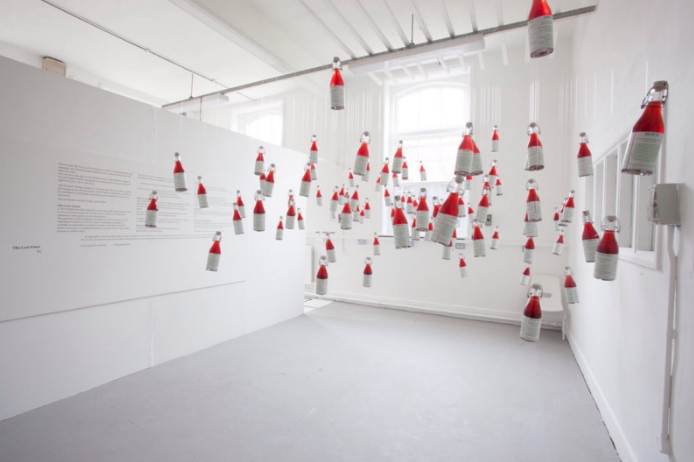
You’re excited or interested to see whatever situation comes, then? You’re ready?
I am kind of happy because if I was protecting myself too much I wouldn’t push these kind of responses, so I think it’s at the same time scary and what will actually bring people to do good. I don’t know how I’m gonna start and when you were asking about feminism… Starting from nothing I should start naked, but I will not. I will not because I think this is not what I want to talk about because it is not about being naked physically, but being naked as a concept. I’m still confused on the way I want to start because I want to start vulnerable, but not as a show for men. It’s not even like being naked is a problem for me, I’m a life drawing model, but I don’t want to be objectified, and I don’t know yet how to not be objectified, and not to also have that as a habit in performance cause I saw a lot of naked people in performance… Everything that I’m doing is metaphoric and poetic, so my beginning has to be also metaphoric and poetic, and I think this is already – to answer your question about feminism – this is feminist to be saying “I will not be naked to start this performance.” This is my feminist step. Actually this is the only thing I am doing as a feminist, purely feminist in this work, that I will not start naked, I will find a way as an artist to start naked metaphorically.
What are your hopes, your plans for this year, for after the exhibition?
My big hope, it’s a dream, would be that it opens me to new opportunities. Hopefully someone, a curator… I didn’t invite anybody (she giggles)… I don’t know… I would like …my work to be able to keep on going and I won’t be able to do that alone, that’s how I’m gonna phrase it. I don’t know exactly what I would like or how I would like it to happen but I would like to hold on a bit, into this next step that I know nothing about because one thing about art school is they don’t teach you how to be an artist, they teach you how to practice art.
To find out more visit: Facebook Event | Alice’s Blog | Alice’s Facebook Page
